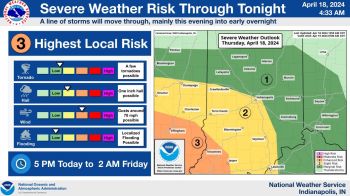INDIANAPOLIS — In case you are planning to clear your own driveway this winter, health professionals have some warnings they would like to impart.
The American Heart Association has said that certain strenuous activities, such as shoveling snow and running a snowblower, could prove dangerous if you have a preexisting heart condition or do not regularly exercise.
The organization notes that these activities can increase stress on the heart, which can lead to higher blood pressure or a higher risk of a heart attack.
Cardiologist Dr. William Gill notes, “The impact of snow removal is especially concerning for people who already have cardiovascular risks…as well as people who have had a heart attack or stroke. People with these characteristics and those who have had bypass surgery or coronary angioplasty simply should not be shoveling snow.”
So, what can be done to prevent these cardiac emergencies? Dr. Gill says prevention is key, meaning it is best to exercise regularly throughout the year in an effort to keep your body as fit and strong as possible.
However, he also recognizes that removing snow is essential for many people who will not have the time or ability to prepare before this year’s winter storms begin. To address this, he encourages monitoring your body and knowing the signs of a problem, staying hydrated, taking breaks, and pushing the snow with a shovel instead of lifting it.
Common signs of a cardiac emergency are pressure in the chest, discomfort in the chest, throat, jaw, upper back, or arm, irregular heart rhythm, nausea, lightheadedness, and shortness of breath, to name a few.
If you believe you are experiencing a problem, call 9-1-1 and immediately try to relax and get warm. And, if you see someone collapse this winter, get help.
You can also get CPR-certified through virtual and in-person classes. Organizations like the YMCA, the American Red Cross, and the American Heart Association are good resources if you are looking to get trained.
Eskenazi Health Emergency Physicians are echoing similar sentiments in regard to the dangers of cold weather. They recommend avoiding “overexertion when participating in outdoor chores or activities, as cold temperatures put a significant strain on the body, increasing the risk of heart attack or chills due to sweating.”
Other possible cold-weather problems include hypothermia, frostbite, and injuries and car accidents caused by snow or ice. Some of these dangers are especially concerning for children and the elderly.
Dr. Tyler Stepsis, Medical Director of the Michael & Susan Smith Emergency Department at Eskenazi Health, says, “The more you move while outside, the better your circulation will be, and always be sure to wear soft clothing against your skin along with many layers of warm apparel….”
He also encourages drivers to keep essentials like blankets, jumper cables, ice scrapers, antifreeze, and granola bars in their cars in case of an accident or breakdown.
Follow winter weather updates through the National Weather Service, or by tuning in to 93.1 WIBC.














